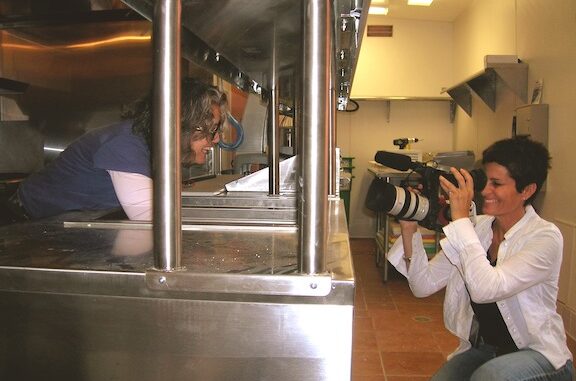
Director Liz Lachman generously agreed to a Q & A with Splash Magazine Worldwide journalist Misty Schwartz. Read below to learn what they discussed.
Can you share a bit about your background and what initially sparked your interest in filmmaking?
My journey into filmmaking unfolded as an evolution rather than a sudden revolution, marked by a gradual awakening. Beginning as a musician, I earned recognition, including an Emmy Award, for composing music for television. My experience as a singer-songwriter and a music editor, collaborating with composers to shape the auditory landscape of films and TV projects, played a pivotal role. As I ventured into screenplay writing, the positive response was immediate, a testament to my early songwriting skills. This paved the way for a natural progression into directing, allowing me to bring my written stories to life.
Were there any particular filmmakers or films that influenced you during your formative years?
One transformative moment in my artistic journey was witnessing Spike Jonze’s film “Being John Malkovich.” The film shattered my preconceived notions about filmmaking, revealing a realm with fewer rules than I had imagined. Jonze’s boundary-breaking approach ignited my creativity, encouraging me to explore unconventional paths in storytelling.
Did you undergo formal education in filmmaking, or are you self-taught? How did your education shape your approach to filmmaking?
Unlike a traditional film school graduate, my educational path in filmmaking diverged. Having already immersed myself in various facets of the industry, I supplemented my knowledge through classes, often from UCLA extension or diverse filmmaking courses. These experiences reinforced the belief that staying true to one’s voice and storytelling vision is crucial, particularly for an independent filmmaker.

What were your initial experiences like when you first started working in the film industry?
My professional journey began with writing music for television, earning me an Emmy.
Can you share a memorable story from your early career that had a significant impact on you?
A pivotal moment occurred when, as a music editor, a producer suggested using normal theme music during a character’s on-screen breakdown. This decision created a powerful emotional impact, showcasing the potency of letting the audience interpret the emotions rather than leading them explicitly.
Are there recurring themes or subjects that you find yourself drawn to in your work?
A recurring theme in my work is the concept of “unmasking,” whether it’s a psychological revelation or exposing the dynamics of group thinking.
How would you describe your artistic style or approach to filmmaking?
This thematic inclination shapes my approach to storytelling.

Navigating the documentary landscape posed a different challenge from narrative filmmaking. While the story dictated the direction to some extent, discovering the underlying theme — the nuanced relationship between Susan Feniger and Mary Sue Milliken — was a late realization. Crafting the narrative involved creating emotional “chapters” to guide the audience through the story, while maintaining a sense of humor.
How do you approach collaboration with other creatives, such as writers, cinematographers, and actors?
In collaborating with others, I believe in open discussions about the story and characters, allowing for a dynamic exchange of ideas and creativity.
What would you consider as some of the key milestones in your filmmaking career?
Key milestones in my career include winning an Emmy for music composition, as well as the success of my short films, “Getting to Know You” and “Pin-Up,” in various film festivals.
Are there specific projects that hold a special place in your heart?
Recognition and praise for “Pin-Up” compared to established filmmakers like Lisa Cholodenko and Brian De Palma were particularly gratifying.
What challenges have you faced in your filmmaking journey, and how have they shaped your growth as a filmmaker?
My journey’s challenges have often stemmed from internal struggles—doubting my abilities, questioning the significance of my stories, and battling self-belief issues.
Is there a particular setback or failure that taught you valuable lessons?
Overcoming these psychological barriers has been instrumental in enhancing my creative output.

Do you have a favorite project that you’ve worked on? What makes it special to you?
Among my favorite projects is the short film “Pin-Up,” a proof of concept derived from a feature script. The film’s success in festivals reinforced the potential for a larger audience, motivating me to pursue its expansion into a feature film.
What are your aspirations for the future of your filmmaking career?
Looking ahead, I aspire to direct two projects: the expansion of “Pin-Up” into a feature film and a screwball comedy titled “Free Chickie.”
Are there specific genres or themes you would like to explore in future projects?
Both projects have received positive responses in script form, and I am eager to secure funding and bring them to life.
What advice do you have for aspiring filmmakers who are just starting their journey?
In offering advice to aspiring filmmakers, I emphasize the value of film school not just for the creative aspects but also for networking opportunities. The connections made during this period can significantly contribute to one’s future career advancement.
Are there lessons you wish someone had shared with you when you were starting out?
Balancing creative passion with networking acumen is crucial in this industry.
————————————————–
Photos provided by Director Liz Lachman
